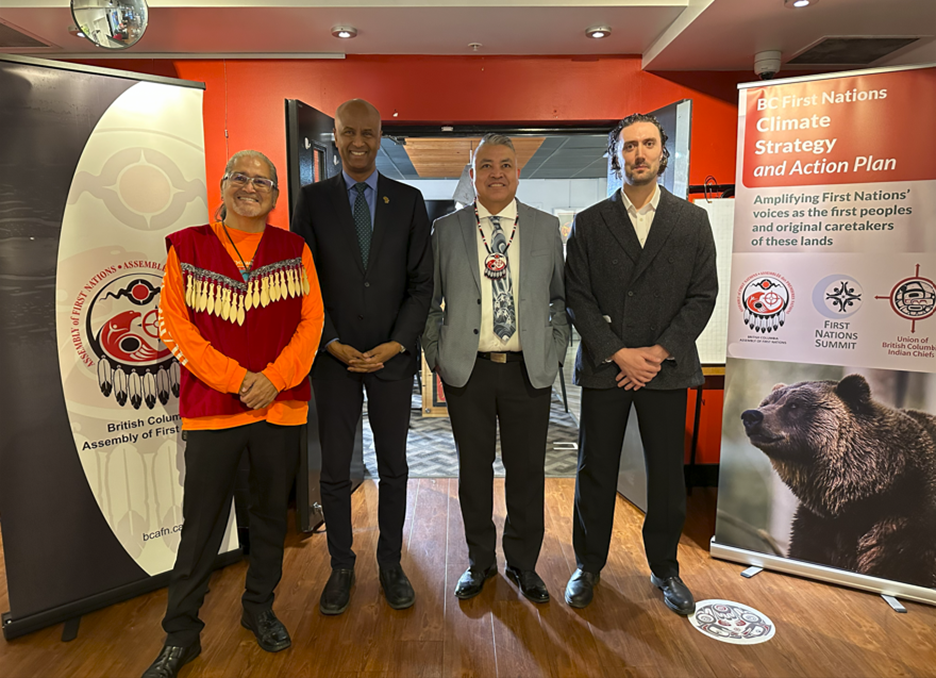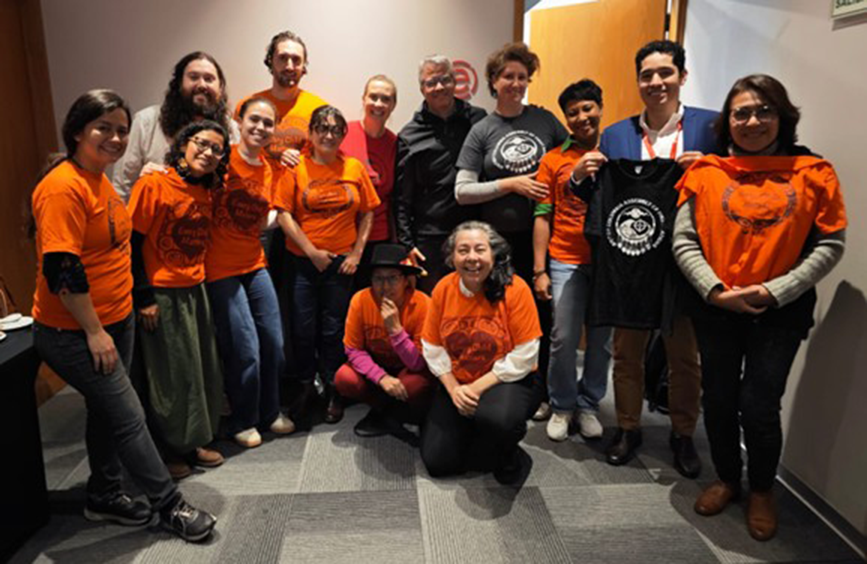The BCRIP Project is no longer accepting new proposals.
While disproportionately affected by climate change, Indigenous Peoples also play a unique and essential role in combating it. Indigenous Peoples have an intrinsic relationship and interconnectedness with Mother Nature and possess ancestral knowledge systems, science, and technologies.
Building international partnerships with Indigenous Peoples from around the world can strengthen climate resilience, promote knowledge sharing, and foster advocacy and long-lasting relationships. Indigenous Peoples from around the world, we can share and uplift our cultural, spiritual, linguistic, and legal principles and practices connected to our harmonious ways of coexisting with Mother Nature, which are vital for climate adaptation, resilience and collective continuance for Indigenous Peoples.
Building Climate Resilience from Indigenous Perspectives (BCRIP) is a four-year (2024 – 2028) Indigenous-led project funded by Global Affairs Canada (Indigenous Peoples Partnering for Climate funding stream). The BCRIP project aims to challenge normalized international development narratives by uplifting Indigenous knowledge systems and science and contributing to Indigenous Peoples’ rights, Self-Determination, and Climate Leadership.
The BCRIP Project will provide funding and support for self-determined Nature-Based Solutions partnership projects. The projects will be collaboratively designed by Indigenous-led Organizations and Nations in Canada and Latin America (Peru, Bolivia, Colombia, and Guatemala), but will be implemented in Latin America.
The Project aims to:
- Focus on several cross-cutting themes, such as Indigenous self-determination, rights, knowledge systems/science and gender equity.
- Build climate resilience and support Indigenous-led climate action through joint advocacy, strengthened governance, relationship building and knowledge-sharing between Indigenous Peoples in Canada and Indigenous Peoples in Peru, Bolivia, Colombia and Guatemala.
Nature-based solutions (NbS) from an Indigenous perspective refer to Indigenous-led approaches to climate solutions grounded in traditional ecological knowledge, principles, practices, and sciences, as well as the right to self-determination, authority and jurisdiction. NbS must recognize the historical and ongoing context of colonization, which has led to land disposition, culture, language and knowledge systems disruption, and systemic social and economic inequalities.
The project is led by a diverse team, including the British Columbia Assembly of First Nations (BCAFN), the Continental Network of Indigenous Women of the Americas (ECMIA SUR), with the support of Save the Children Canada (National Reconciliation Program) and Save the Children Latin America and Caribbean.
INDIGENOUS-LED PROJECT
The BCRIP project is being implemented by a technical, overarching project team from the partner organizations, guided and steered by two Indigenous-led governance structures: The Indigenous Wisdom and Knowledge Circle (IWKC) and an Indigenous Steering Group (ISG).
The IWKC is an advisory council, offering guidance and recommendations on the guiding principles and selection of the Partnership Projects. Provides guidance to ensure the project embeds Indigenous rights, values, knowledge, and ways of being.
The ISG is responsible for monitoring the overall governance, including compliance, oversight functions and the selection of the partnership projects.
MANDATE
The Building Climate Resilience from Indigenous Perspectives (BCRIP) Project is an opportunity to deliver on BCAFN's mandate to pursue international advocacy opportunities on climate change, Indigenous rights, and sovereignty and build relationships for joint action and advocacy with Indigenous Peoples abroad.
Resolution 32/2023
Resolution 05/2021
THE CALL FOR PROPOSALS
In March 2025, the BCRIP project announced a Call for Proposals for joint partnership projects between Indigenous peoples in Canada and Indigenous peoples from Bolivia, Colombia, Guatemala, and Peru. Indigenous co-applicants in Canada were able to apply for up to $207,000 per project over 12-24 months; whereas the co-applicants from Bolivia, Colombia, Guatemala, and Peru were able to apply for one of three categories: CAD 100,000-122,000 (small grant) CAD 300,000-390,000 (medium grant), CAD 600,000-633,000 (large grant).
The Call for Proposals closed in June 2025. 10 Indigenous-led Nature-Based Solutions Partnership Projects have been selected, and implementation is scheduled for late 2025 to early 2026.
THE PARTNERSHIP PROJECTS
The BCRIP Project will fund 10 collaborative partnership projects, led by 10 Indigenous Organizations and Nations from Bolivia, Colombia, Guatemala, Peru, and 8 First Nations in BC, as well as one Inuit organization in Canada. The North/South partnership projects will co-design climate resilience initiatives, weaving self-determined Nature-based Solutions (NbS) with ancestral knowledge and science, cultural revitalization, Indigenous rights, and Indigenous-led climate leadership.
The projects promote ecosystem restoration through practices such as reforestation with native species, water harvesting, seed conservation, and sustainable agriculture. The North and South collaboration strengthens this work through a continuous process of mutual and reciprocal learning, where all partners build on their respective strengths. The projects also place gender equity, self-determination, Indigenous rights, and intergenerational knowledge transfer at the core, with mechanisms to ensure meaningful participation and uplift women, 2SLGBTQQIA+ individuals, and youth climate leadership.
The 10 collaborative partnership projects will be announced soon.
GET IN TOUCH
Patricia Rojas: patricia.rojas@bcafn.ca
Kristi Denby: kristi.denby@bcafn.ca
MATERIALS AND ADDITIONAL INFO
BCRIP Project Announcement
BCRIP Infosheet PDF
Indigenous Steering Group Terms of Reference PDF
APPLICATION RESOURCE ARCHIVES:
Application Guide
Financial Guidance
FAQs
Presentation Slides from Informational Webinar on March 3, 2025
Application Template
Budget Template



